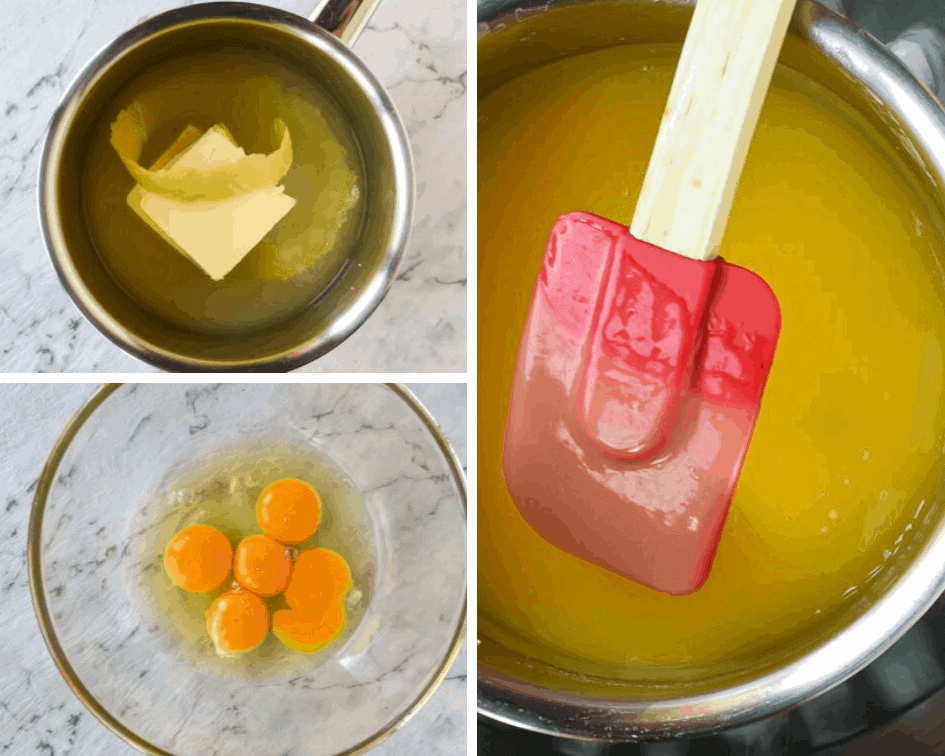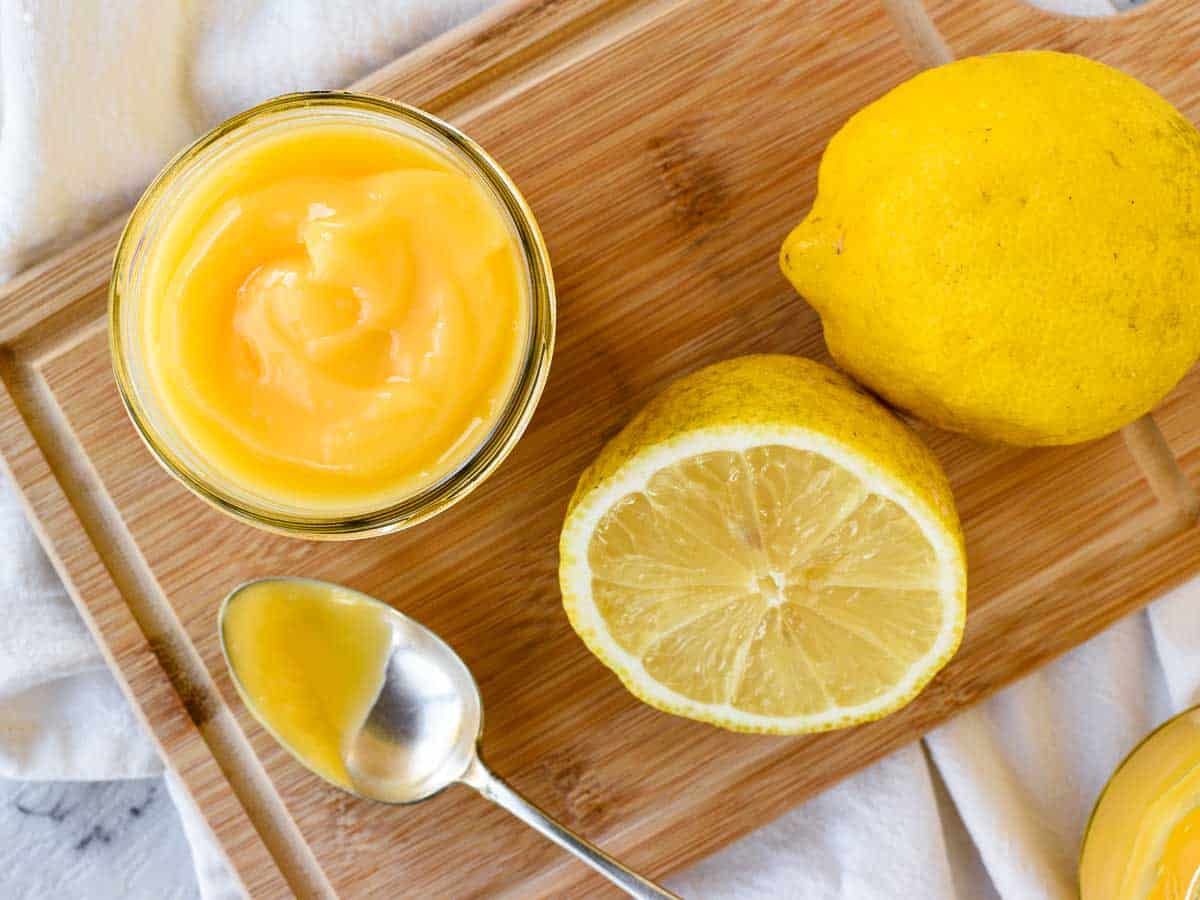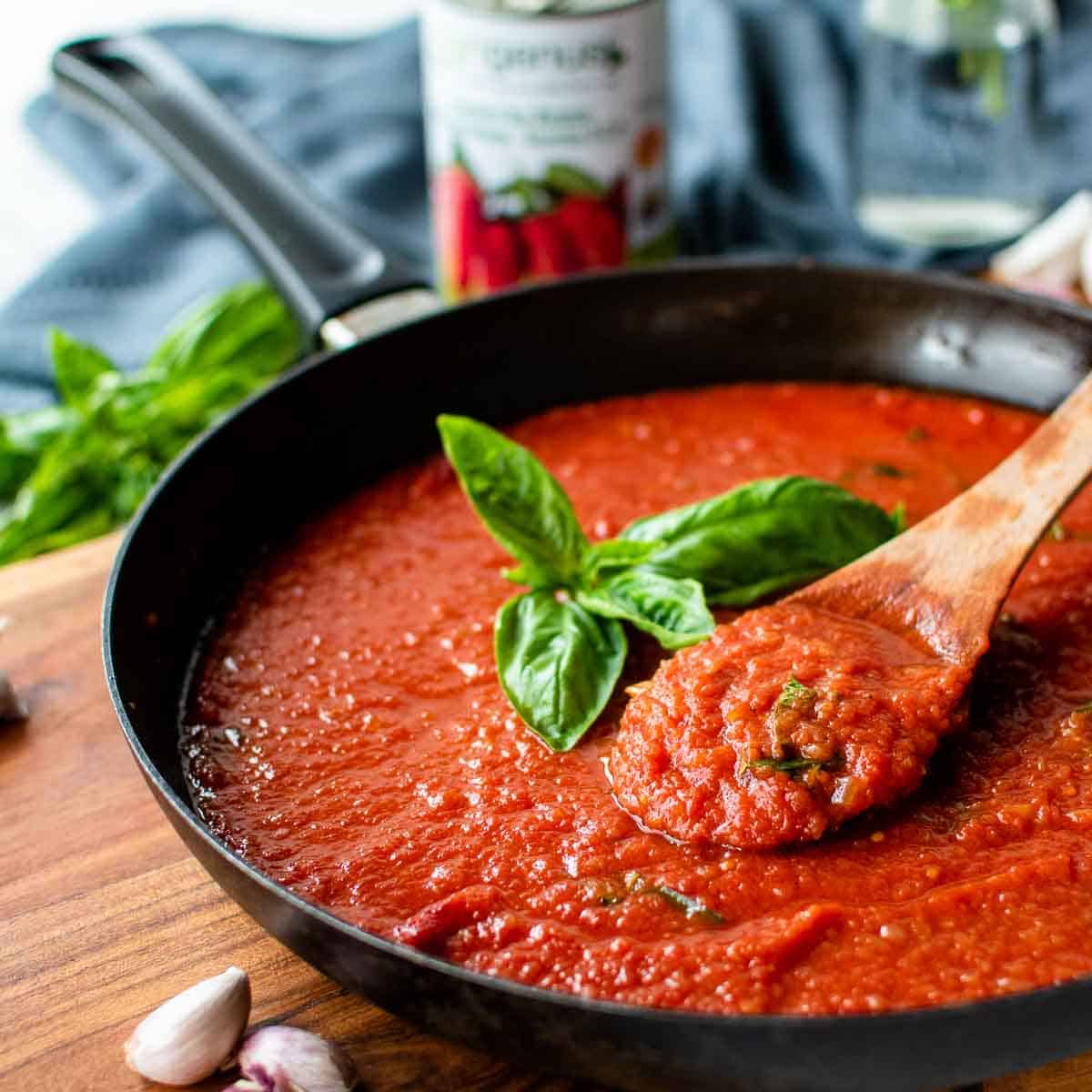Lemon Curd Recipe
This Lemon Curd is tangy, thick and delicious and so easy to make at home and there are so many uses for it that you will never run out of ideas!
You’ll need just 4 ingredients and less than 30 minutes to make this recipe.

Curd may not sound appealing. Too many thoughts of curds and wheys, maybe? However tangy perfect Lemon Curd is almost like a smooth custard with a delicious lemon flavor. And while my version contains lots of eggs it doesn’t taste eggy at all.
I like to strain the mixture before cooking to remove any chalaze (that’s the white string that is attached to the yolk). Some recipes recommend straining after cooking to remove any cooked egg. If you have cooked egg in your lemon curd it’s going to taste like lemon scrambled eggs and no amount of straining is going to remove that taste.
Lemon curd failures abound. It can curdle if overcooked and taste eggy. It can be thin and watery if not cooked enough. Have no fear! If you follow my instructions, you will find this lemon curd easy and relatively foolproof.
You’ll love this recipe because:
- This recipe for lemon curd works! Follow all my instructions and tips, which you can read fully below, and you’ll make the smoothest, tangy lemon curd ever!
- It’s versatile! You can read further done the page how many uses there are for this wonderful thick spread. Use it as a filling, a spread or eat it by the spoonful.
- You can freeze it! Yes, that’s right. This curd freezes beautifully. So, if you’ve made too much and you really can’t use it all – freeze it for later!
Ingredients
- Lemons – Use unwaxed lemons that are full of fresh lemon juice and have fragrant zest. At a pinch, you can use bottled lemon juice. You won’t have the added flavor of the lemon zest but the curd will still be quite delicious.
- Unsalted Butter – Please use good quality unsalted butter. This recipe relies of the flavor of butter so this is very important. Absolutely never use margarine.
- Sugar – White sugar gives the best color. Using superfine sugar means is dissolves quickly but it’s not absolutely necessary.
- Eggs – I do prefer free range eggs with bright yellow yolks and I suggest you use them too.
Variations
Substitute with orange juice and zest for a tasty orange curd.
Instructions

This lemon curd recipe doesn’t need a double boiler. Follow my instructions and tips for perfect lemon curd.
- Heat the sugar together with the lemon juice, lemon rind and butter over medium heat to melt the butter and dissolve the sugar.
- Lightly whisk the eggs and yolk then pour slowly in the hot lemon mixture whisking the whole time.
- Strain back into the saucepan and cook gently over low heat until the mixture thickens.
Adjust the heat if necessary while cooking the homemade lemon curd. Be careful not to overheat or over cook the mixture because you end up with lemon scrambled eggs.
Have a large bowl of iced water nearby. When the curd is perfect, sit the bottom of the pan into the iced water to immediately stop the cooking. Stir the curd regularly as it cools.
Lemon curd uses
So what can you do with lemon curd? There are literally hundreds of lemon curd uses available to you for a classic recipe like this. I will give you just a few then it’s up to your imagination and taste buds.

- on homemade English scones.
- with yoghurt and granola for breakfast.
- swirled through cream and serve with fruit for dessert.
- top these mini pancakes with generous lashings.
- fill a plain cake like this vanilla cake.
- use a good pastry recipe like this Italian sweet pastry to make little tarts to fill with lemon curd.
- make these delicious lemon curd cookies.
- sandwich between these Italian butter cookies.
- with ice cream after a main course of delicious homemade cavatelli pasta
- top mascarpone with this tangy sauce.
You will even eat it straight off the spoon – I guarantee!
Can you freeze lemon curd?
Yes! I do this all the time. Lemon curd freezes beautifully and there is no change in the texture or taste after thawing. That’s right, it remains thick and smooth even when frozen for up to 12 months.
Simply fill a freezer safe container with cooled homemade lemon curd to 1/2 inch (1.3cm) from the top. You’ll need this space because the curd will expand as it freezes. Seal the container and freeze for up to a year.
The only thing you need to be careful of is freezer burn. This happens when food is exposed to the cold, dry freezer air. Avoid this by sealing in an airtight container. If the lemon curd suffers freezer burn, you’ll notice it doesn’t taste right. Try removing the outer layer. This should make it taste better.
Of course, the fresher the curd is when it goes into the freezer, the better it will be when it is thawed. So if you know you aren’t going to use all of the homemade lemon curd in two or three days, pop the excess into the freezer.
To thaw, move the container to the fridge 24 hours before you want to use it. Once thawed, be sure to store in the fridge and use within 2 weeks.
Freezing means that a glut of lemons doesn’t get wasted. Make a few batches of this homemade lemon curd and you won’t have to buy it all year. How resourceful is that?
Tips for Success and FAQ’s

My Italian mother always peeled a strip of lemon rind to add to her custards and Italian pastry cream. This is the trick used here to intensify the lemon flavor. Use a vegetable peeler to cut a thin but long strip of lemon rind. Remember not to take any of the white pith which is bitter.
If you’d like a more intense lemon flavor increase the quantity of lemon juice for extra pucker. Add up to 3/4 of a cup of lemon juice. When using Meyer lemons, reduce the amount of sugar slightly because Meyer lemons are not as tangy or acidic.
Here are my top 8 tips for making lemon curd.
- It’s best to use fresh lemon juice but at a pinch you could use bottled.
- Buy good quality unsalted butter and free range eggs.
- Lemon juice can react to some metals such as aluminium, copper and iron so be sure to use a stainless steel saucepan.
- Since cooked egg is the enemy of delicious, homemade lemon curd, it is important to heat the mixture slowly and over low heat. You can use a double boil or a glass bowl over a pot of simmering water. However I find that this lemon curd recipe can be successful made without a double boiler. You must be careful not to overheat and don’t leave the lemon curd even for a second.
- That leads me to the next tip – never allow the curd to boil. If you notice it getting to hot, remove the pot from the heat, stir well then return to the heat.
- Have a large bowl of iced water nearby just in case you have to arrest the cooking quickly by plunging the pot base into the iced water.
- When the lemon curd is ready, pour into a bowl or jug to cool. If you leave it in the saucepan to cool, you will risk overcooked lemon curd.
Yes, it definitely will become thicker as it cools. Also homemade lemon curd with whole eggs is thicker and lighter than if you use egg yolks only. This is a perfect lemon curd recipe because it is the ideal ratio of lightness of with whole eggs and richness of the egg yolks.
Egg white coagulate earlier than egg yolk but I have never found a problem with this recipe. This could be because the eggs are tempered with the hot lemon/sugar/butter mixture.
As well as using whole eggs, this lemon curd recipe has quite a lot of butter. When cooled, the butter thickens and creates a smooth, creamy lemon curd.
It will thicken as it cools and the butter sets. However if it’s still runny it’s likely that the lemon curd hasn’t reached the correct temperature when cooking. You could try returning it to the pot and slowly heating it up, stirring constantly until it has thickened and coats the back of a spoon.
Yes! When the lemon curd is ready, pour into a jug to cool. Once there is no more steam rising, place plastic wrap onto the curd and transfer the jug to the refrigerator to cool completely (3 hours or overnight).
Absolutely! Fill a freezer container with the curd leaving some space for expansion. Seal well and freeze for up to a year. Thaw in the fridge 24 hours before you want to use it.
Be sure to check out extra tips for freezing above.
This lemon curd does contain eggs and lemon juice which have good nutrients and healthy properties. However, this also contains lots of butter and sugar so consider it occasional food.
Follow this recipe for the best ever, homemade Lemon Curd. You will love having a jar of this in the fridge where it will keep for a couple of weeks.
Lemon curd can be frozen but it never lasts that long in my house. If you do try making my homemade Lemon Curd, let me know how you like it.
More recipes you’ll love
Italian Meringue Buttercream
Strawberry Jam Recipe
Cherry Sauce
Raspberry Compote
Blueberry Compote
Brutti ma Buoni
Made this recipe?
Please let me know if you liked it by leaving a ★★★★★ star rating and a review below. And remember to subscribe to my newsletter – it’s free!

Homemade Lemon Curd Recipe
Ingredients
- ½ cup (120mls) lemon juice
- long strip of lemon rind with no white pith
- 6 oz (1½ sticks/170g) unsalted butter
- 1 cup (200g) sugar
- 3 eggs
- 2 egg yolk
Instructions
- In a medium saucepan place lemon juice, lemon rind, butter and sugar. Heat, stiring occasionally, over a medium heat until the butter has melted and the sugar has dissolved.
- In a bowl, place eggs and additional egg yolks and whisk until combined.
- Whisking the eggs, slowly pour in the lemon mixture. It is important to keep whisking while you do this.
- Strain the lemon curd mixture through a sieve back into the saucepan to remove any “eggy bits”.
- Cook over a low heat until the mixture has thickened and coats the back of a spoon. At low heat this can take as long as 10 minutes. If you are more experienced, use medium heat and it will take as little as 5 minutes.
- Be careful not to overheat and overcook the mixture – you will then have lemon flavored scrambled eggs. I like to not risk further cooking of the curd by immediately placing the saucepan into ice water to stop any further cooking. Stir regularly while the curd cools. You could also pour the lemon curd into a jug or bowl if the saucepan is particularly hot to stop overcooking.
- Once mixture has cooled place in a sterilised jar and store in the fridge. Lemon curd will last for a couple of weeks in the fridge and it can be frozen.
Notes
- Add up to an additional 1/4 cup of lemon juice.
- Reduce the sugar slightly.
- Use fresh lemon juice not bottled.
- Buy good quality butter and free range eggs.
- Lemon juice can react to some metals such as aluminium, copper and iron so be sure to use a stainless steel saucepan.
- Since cooked egg is the enemy of delicious, homemade lemon curd, it is important to heat the mixture slowly and over low heat. You can use a double boil or a glass bowl over a pot of simmering water. However I find that this curd recipe can be successful made without a double boiler. You must be careful not to overheat and don’t leave the lemon curd even for a second.
- That leads me to the next tip – never allow the curd to boil. If you notice it getting to hot, remove the pot from the heat, stir well then return to the heat.
- Have a large bowl of iced water nearby just in case you have to arrest the cooking quickly by plunging the pot base into the iced water.
- When the lemon curd is ready, pour into a bowl or jug to cool. If you leave it in the saucepan to cool, you will risk overcooked lemon curd.
Nutritional Estimate Per Serving
Nutritional Disclaimer
Nutritional information is an estimate provided by an online nutrition calculator. For accurate results, it is recommended that the nutritional information be calculated based on the ingredients and brands you use.








The best curd I ever made. I made it for a pavlova lots of complements. Thank you
You’re welcome, Issy! I love it on pavlova too!!
Absolutely delicious! I made it twice in one day, followed your instructions exactly. Thank you!
I’m happy that you loved it as much as I do, Alcira!
How much does this make? The recipe says 25 servings, but there’s no indication of what a serving size is. Are we talking a total of 2 cups? 3 cups? 1½ cups?
Hello Desiree, in the recipe card the summary of the recipe reads “This Homemade Lemon Curd is tangy, thick and delicious. Use lemon curd to top scones, fill cakes and tarts or simply swirl through your morning yoghurt. Makes 600mls or 2 ½ cups.”. And it actually says “20 serves” not 25. Hope that helps.
Homemade lemon curd is really the best!! Thanks for this recipe!
So much easier to make lemon curd from scratch than I ever thought. Your tips were super helpful and contributed to my success! Will definitely be making again.
I am looking forward to trying out this recipe, I can already taste the lemon flavour. Ingredients are all ready to go
First of all thanks for sharing this with us, It’s very timely as I’m looking for this kind of recipe. This homemade lemon curd looks absolutely delicious and tasty. I love the color it gives and that makes it so enticing.
I love the idea that I’ll not feel the eggy taste or smell in this recipe, this makes it a good recipe to try out for my guests.
You absolutely won’t! Just cook the lemon curd gently. Enjoy xx
I love lemon curd but I had never thought to make my own! This is such a foolproof recipe, thank you!
You’re welcome!
Ccan you prosecus this in a canner to give it more shelf life?
Hi Deb! While I have never canned lemon curd, it is possible. Use within 3-4 months however if any separation or discolouration occurs, discard the lemon curd. For longer storage, I freeze lemon curd in small zip lock bags.
How do you measure 1/2 egg?
I’m assuming that you’re attempting to make 1/2 batch of the lemon curd which would result in the measurement of 1/2 an egg. If that’s not the case, you may have inadvertently adjusted the servings section in the recipe card. It should read 20 servings. You can simply adjust that back to what it should be or refresh the page.
If you plan to make 1/2 a batch of lemon curd, then this is what I would do. Beat the egg and then measure how much you have. Usually that’s about 3 tablespoons or 45mls. Take half of that. It doesn’t have to be exact but erring on more rather than less would be best.
Keep in mind that if you make a full batch, extra lemon curd freezes beautifully.
I’m such a ditz and hurriedly read the instructions as to add the lemon and whisked egg TOGETHER and then add it to the butter/sugar/rind saucepan mixture. It ended up working without a problem! The secret (I think) to incorporate eggs while the temperature is still warming up, keep the heat on low, and keep whisking until it thickens. I also sieved it at the very end to remove eggy bits (just a couple small pieces) + the lemon rind.
Thanks for a great recipe! I will add it to my book!
Alls well that ends well! Roxy, sounds like you saved it! Yes, if you don’t warm the lemon, butter and sugar up first, you would need to heat slowly and gently. So happy you enjoyed the lemon curd as much as I do! xx
Amazing lemon curd. We found your recipe really easy to use. We had plenty of tastes before bottling.
A wonderful balance between sweet and sour fragrant lemon.
Glad you enjoyed it as much as we do, Yvonne!
how i love lemon curd or lemon butter as our mums used to call it:) so delicious so tangy!
My mum (being Italian) didn’t make it but I love it! I’ve got to stop myself because I can’t resist!
Is this thick enough to be used as the lemon part of lemon meringue pie ?
If not, what would you suggest to thicken it ?
Thanks
Pam, it would be fine but maybe not as thick as what you may expect. I use it for lemon tartlets and it’s good. If you do want to thicken it, use 1 tablespoon of cornstarch/cornflour. First combine it in the lemon juice making sure there are no lumps then continue with the recipe. You may not be able to strain it if it’s too thick but it will be fine. This will thicken it just a little and I think that may be all you’ll need. I’ve never tried it but I think it will work. Let me know how you go.